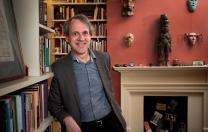Since arriving at Harvard in 2009, Damrosch has attempted to open the conversation on world literature—and with it, the discipline of comparative literature—through a collaborative international program, with 54 institutional affiliates, called the Institute for World Literature (IWL); it held its ninth summer session in July. The four-week program assembles a core faculty of literary scholars and some 150 fellow scholars and graduate students for a month of seminars on a range of relevant topics; those for past sessions have included: “How Do Literary Works Cross Borders (Or Not)?” “Science Fiction and the Imagination of Planetary Futures,” “Environmental Humanities and New Materialisms.” “There’s a lot of interest in the idea of world literature, but at a lot of places, people are not really trained to work beyond a single century in a single country,” Damrosch, who also directs the IWL, explains. “The institute is meant to train people”—not just to pay lip service to “thinking globally,” but to urge scholars to “be in the world” and have conversations in person across nations and languages. The venue of the IWL rotates in three-year cycles; for two years, it convenes at universities outside the United States; the third year is always at Harvard. Past hosts have included universities in Istanbul, Copenhagen, Tokyo, Hong Kong, Beijing, and Lisbon.
A number of IWL participants have described the experience as an important part of justifying and explaining the discipline in various ways. Karen Thornber, professor of comparative literature and East Asian literature, taught environmental literary criticism at past IWL sessions, and concluded, “It makes us better communicators. And that sounds kind of trite in a way, but I think one of the challenges facing the humanities now is that we’re not as clear as we might be about why the humanities matter and why it’s important for students to study the humanities. Since the IWL takes place in different parts of the world, [students] learn how to become much better communicators about their own research. We take them—and ourselves—outside of our research bubbles and talk more clearly.”
Rebecca Walkowitz, chair of the Rutgers English department, who has taught a class on close reading and world literature at two IWL sessions, notes that all universities pay lip service to the goal of educating people for “global citizenship,” but “those of us coming out of the humanities feel strongly that there is no global citizenship without multilingualism: you can’t be an educated citizen if you only have encounters with the language, literature, history, and culture of one place. The IWL, it seems to me, is a chance to think about what the humanities can contribute, and shows how humanistic learning in multiple languages helps us understand what it means to participate internationally.”








